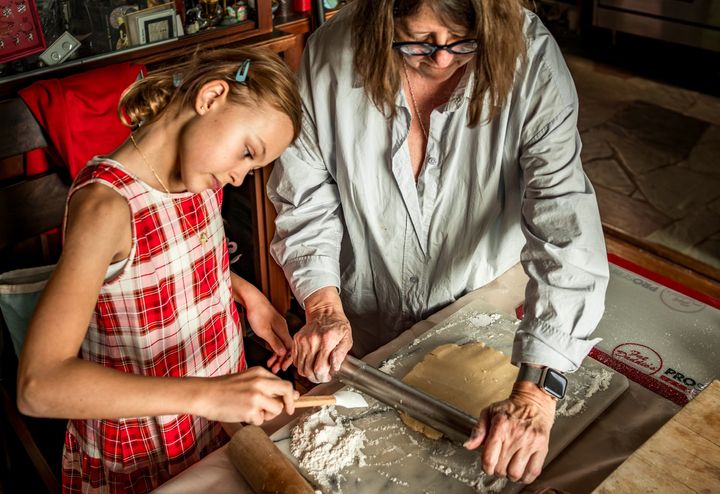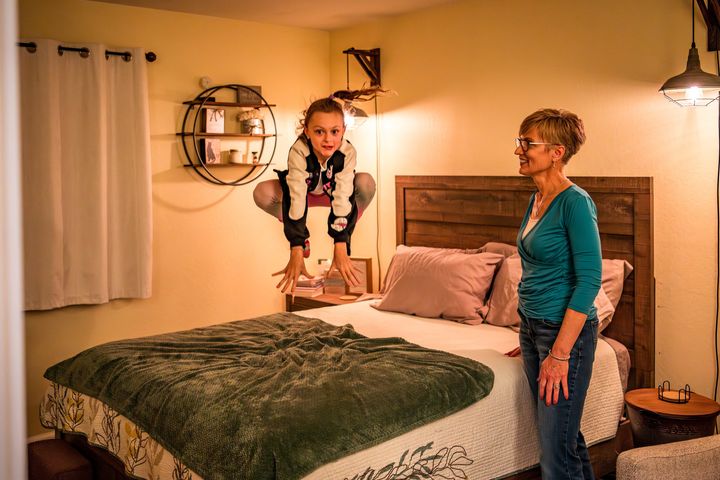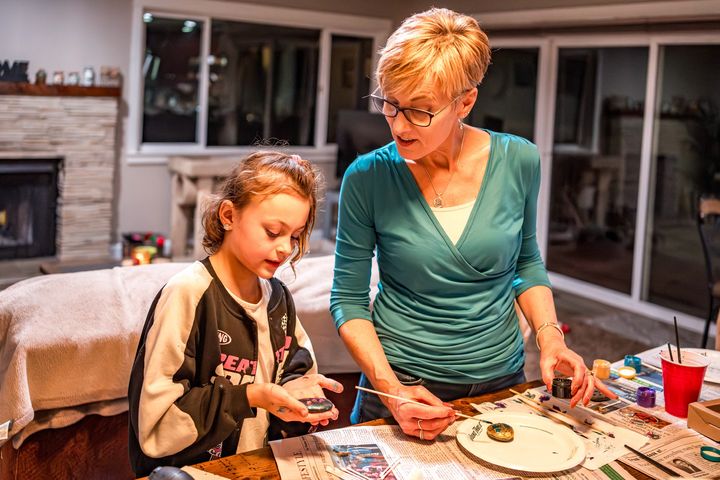News
These Surrogate Grandparents Will Restore Your Faith In Humanity
Ania Zimnoch, a photographer living in the San Francisco Bay Area, found herself weathering a rough patch several years ago. Her husband of 16 years had left, making her the sole parent to her daughter Ella, now nine years old. Zimnoch’s mother, who lived all the way on the other side of the country, was also ill.
“I was lonely and going through a difficult period in my life,” Zimnoch told HuffPost.
Zimnoch’s loneliness led her to search online for some sort of solution. While browsing one night, she discovered a Facebook group for “surrogate grandparents”: families with children looking for the kind of care and support that biological grandparents often provide — and older individuals seeking that kind of a caring relationship — write posts introducing themselves and then wait to see if anyone else in the group is a potential match.
Figuring she didn’t have anything to lose, Zimnoch said she wrote a post revealing “the truth” about her current situation. She also wrote that she had “a daughter who’s very spunky and creative, and we’re looking for connections.”
Because the Facebook group is national, there’s no guarantee of finding a match in your geographical area. At first, Zimnoch said, most of the people who responded to her post were “out-of-state well-wishers.” She did meet up with one woman who lived nearby, but “she turned out not to be a match,” Zimnoch said. While she “felt disappointed,” she had forgotten about the whole thing until months later, when a woman named Christine sent her a message on Facebook.
“I shared a little bit about myself, she shared some things about herself, and we decided to schedule a phone call,” Zimnoch said.
“We liked each other’s company and it was easy to talk to her. So we decided to give it a try,” she said, and have Christine meet Ella.
The two share a fondness for arts and crafts, and Christine brought Ella a little crafting gift the first time they met. Christine also offered her help with Zimnoch’s applications to grad school. Soon, the three were attending theater performances and visiting a local science museum together.
“It was it was nice to to have someone treat us like a blessing and not a burden,” Zimnoch said.
Christine has three daughters in their 20s, none of whom have children yet. She does, however, have several other surrogate grandchildren whom she connected with via the Facebook group.
“She asked me first if I didn’t mind that she connected with somebody else,” Zimnoch said — which she said she appreciated, although she never would’ve asked Christine not to.
“If her heart is that big and that expandable, then she should connect with other families for sure,” Zimnoch said.
She described her relationship with Christine as a friendship. Chrstine also helps out with childcare sometimes when Zimnoch is in a pinch, just like a grandmother or other relative might.
Zimnoch and her daughter don’t have any family members living in the area, but they now have two surrogate grandmothers. Bebe, a woman living in Berkeley, connected with Zimnoch some moths after Christine came into their lives.
It was around this time that Zimnoch’s mother passed away, and Bebe, who she had only just met, offered to pay for her ticket back East.
“I didn’t accept it, but you know, I didn’t forget,” Zimnoch said.
Being with Bebe, and doing things like decorating Christmas cookies, has helped Zimnoch and her daughter move through her grief. In addition, Bebe’s proximity has meant she is able to help out with school pick-ups. One week, she took care of getting Ella to and from her camp every day so that her mother could work a photo shoot in San Francisco — something Zimnoch doesn’t know how she would have managed on her own.

Bebe and Christine might seem like a rare breed, willing and eager to take on bonus family members and to do more caregiving. But they aren’t the only ones interested in the idea of being a surrogate grandparent.
There are 10,300 members in the Surrogate Grandparents USA Facebook group, which Donna Skora started when she learned that such groups existed in other countries but not yet her own. Skora told HuffPost that she is an “alienated grandparent” but has chosen to make the best of her situation by bringing surrogate grandchildren into her life and helping other people find similar connections.
About 95% of the Facebook members are women, the majority of whom are in their late 40s, 50s and 60s. Once a person becomes a member of the private Facebook group, they have access to “a list of grandparents seeking connections and a list of families seeking connections … alphabetized state by state, for the convenience of the members, to have the ability to locate and find each other,” Skora explained.
More recently, the site has expanded its reach, serving foster children who have aged out of the system and are looking for familial connections, as well as helping grandparents who are raising grandchildren full time find respite care.
Like Zimnoch, people generally post a short introduction and then message anyone who they’re interested in contacting. As far as safety goes, Skora said that the group “strongly urges members to contact their local law enforcement agency to have background checks performed.” In addition, all of the grandparents HuffPost spoke with held their first meetings with families in public spaces.
Nancy Schettler, a 64-year-old mother to three adult children living in western New York state, came to the Facebook group after her kids had moved away to work in different cities. While she doesn’t want to pester her own kids about their dating lives or their plans to have children, Schettler told HuffPost, “I miss having a younger person around. They add so much sparkle and enthusiasm.”
“The house was way too empty and way too quiet,” Schettler said. She began looking into foster parenting and foster grandparenting, eventually making her way to the surrogate grandparents page. Like many other members, she initially lurked, just looking around to see what other people were posting.
She was struck, she said, by “the candor, and the bravery with which people posted their stories” — parents and grandparents alike. “There were just such so many needs out there.”

Eventually, someone in Schettler’s vicinity posted, and they began messaging one another. The mother was hesitant. Her daughter had autism, she explained. She and her husband had tattoos and piercings.
“You’re just not scaring me away. It’s not working,” Schettler told her. They have since met in person — Schettler calls the family “delightful” — and recently took a little road trip together chasing the Northern Lights.
Another family who contacted Schettler was “very cautious,” she remembered. They wanted to meet Schettler and her husband before introducing them to their children, several of whom had been adopted from foster care.
While she has connected with a third family as well, Schettler said, “there are probably at least as many connections that I’ve tried for — some of them, they don’t go anywhere.”
Skora explained that this experience is common. “The process of attempting to connect with each other definitely takes some time and patience,” she said.
Some potential grandparents talk about being “ghosted” by families. Parents sometimes end up dropping connections, mostly out of fear, Kathy B., a surrogate grandparent and a longtime moderator for the Facebook page, told HuffPost.
She advised potential grandparents to be “patient with the uneasy parents.”
“They want this for their children, but they’re also scared that there’s a lot of danger out there,” Kathy B., who asked that HuffPost withhold her full name, said.
In opening themselves to connecting with a match, both parties are vulnerable. Parents worry for their children’s safety, and grandparents may worry that someone is planning to take advantage of their generosity.
Kathy B., who lives in Texas, has seven granddaughters of her own, in addition to a surrogate granddaughter, who has been in her life since she was an infant. The surrogate granddaughter’s mom is a single mother by choice, and her biological grandmother lives far away. She is now 8 years old, and Kathy B. has gone with her to the zoo, amusement parks and on camping trips. She makes photo books for all of her granddaughters, surrogate or otherwise, and holds tea parties for them.
These activities can be tricky to schedule, however. One of Kathy B.’s daughters decided from the start that she doesn’t want a relationship with the surrogate granddaughter, and will not let her own children socialize with her. This leaves Kathy B. to arrange two sets of gatherings in order to see all of her grandchildren. She knows that, in the beginning, her daughters were concerned that someone would take advantage of her as a surrogate grandparent, but more than seven years have now passed. Kathy B. said she still doesn’t understand why one of her daughters isn’t accepting of this chosen family.
In spite of this conflict, Kathy B. and her husband enjoy a warm relationship with her surrogate granddaughter and her mom. Kathy B.’s husband is the only grandfather in the girl’s life, and she “has a special place in his heart.”
In return, Kathy B. said that the girl’s mom is “so appreciative,” she said. “She and I have developed a great friendship. We communicate all the time.”
While the risk of rejection is real, Kathy B. believes that the rewards are well worth it.
Zimroch said the same is true for parents and kids. She urges parents to take the plunge and see if they can make a connection with a surrogate. “There’s so much wisdom that comes from a multi-generational relationship, and there’s a lot of advantages, a lot of beautiful things that can come out of it.”
Some of these may come as a surprise.
Schettler recounted a story about mysterious Christmas packages that began showing up on her doorstep one year in mid-December. When they gathered for the holiday with their surrogate grandchildren, one of the kids revealed that their family had been behind the 12 days of presents. Schettler was touched.
“Everybody ought to have the opportunity once in their life to be thought of so pointedly by somebody else,” she said. “It’s huge and could be so healing.”
Read more

